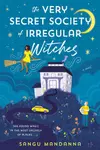
NJ
As someone with GAD Paris' inner monologue was very realistic but it was also exhausting and at times difficult to get through. I read romance partly because I want to escape my brain's endless catastrophizing and reading this book did not feel like an escape at all. This wasn't the frothy rom-com the cover promised and maybe if I'd known better what to expect I might have had a more enjoyable experience.
I'm going to leave this unrated because I don't fully know how I feel about it.
On the one hand, I loved the magic system, the themes and some of the characters but overall I wanted more darkness from the book. When I'm reading a fantasy dark academia, I expect it to be dark and twisty and brutal from the beginning and this lacked that for me. Additionally, I have realised that I don't enjoy reading about passive characters, particularly in fantasy. Robin changes a lot in the end but especially in the beginning I wanted him to have more of the eye of the tiger. Now this doesn't speak to the overall quality of Robin's character it's just my personal preference. So overall, I realise it might objectively be a good book, it just lacked certain things that make a book in this genre sing for me.
Reading this made me realise how little diversity there is in straight romance dynamics. I can't remember how many books I've read where the woman is a domme and the man is a sub, it feels like such a missed opportunity. It reminds me of how tired I am of the grumpy x sunshine trope because with the exception of a handful of books, in heterosexual romance the male lead is grumpy and the female lead is sunshine. But, I personally love reading about grumpy women. The grumpier the better! Maybe I need to do better at searching for those kinds of dynamics
This book was cute and there were feminist undertones that were nearly impossible to miss. If I don't think about this book for too hard or too long, it leaves me with a warm, fuzzy feeling. But when I sit with the book for a bit, I can't help but be troubled by the resolution of its non-romance plot. My complaints about this book, mirror the issues I had with [b:Spellmaker 54245639 Spellmaker (Spellbreaker Duology, #2) Charlie N. Holmberg https://i.gr-assets.com/images/S/compressed.photo.goodreads.com/books/1592969483l/54245639.SY75.jpg 72395126]. Ultimately, if your villain raises valid points about inequities in your society, and those inequities are left unaddressed by your protagonists, it leaves a sour taste in my mouth. How am I to root for people who would let unjust systems stand untouched? Makram's brother Kinus gets a lot of flack for rightfully pointing out that in the old system the most powerful mages held power whether they were good people or not. Yet, Naime and Makram want the return of the old system for the balance of the wheel, forgetting that it was when the wheel was in balance that a mass genocide of one of the houses occurred. The wheel's equilibrium did not stop Naime's ancestors from hunting an entire people. Yet she advocates a return to that system with no checks or balances that would ensure future generations would not commit the mistakes of the past and it seems there is to be no restitution for the damages caused in the past. I don't need every fantasy I read to end in a democracy. However, I need the protagonists to thoughtfully grapple with the inequities of their society and at least come to a semi-sensible resolution. One of the few series in which I have seen the protagonists engage with the valid points made by the antagonists is the [b:Daevabad Trilogy Collection 57213849 Daevabad Trilogy Collection (The Daevabad Trilogy, #1-3) S.A. Chakraborty https://i.gr-assets.com/images/S/compressed.photo.goodreads.com/books/1614338979l/57213849.SX50.jpg 89547986] and reading [b:Reign & Ruin 50607309 Reign & Ruin (Mages of the Wheel, #1) J.D. Evans https://i.gr-assets.com/images/S/compressed.photo.goodreads.com/books/1579555916l/50607309.SX50.jpg 73107342] has made me appreciate it that much more.

















































